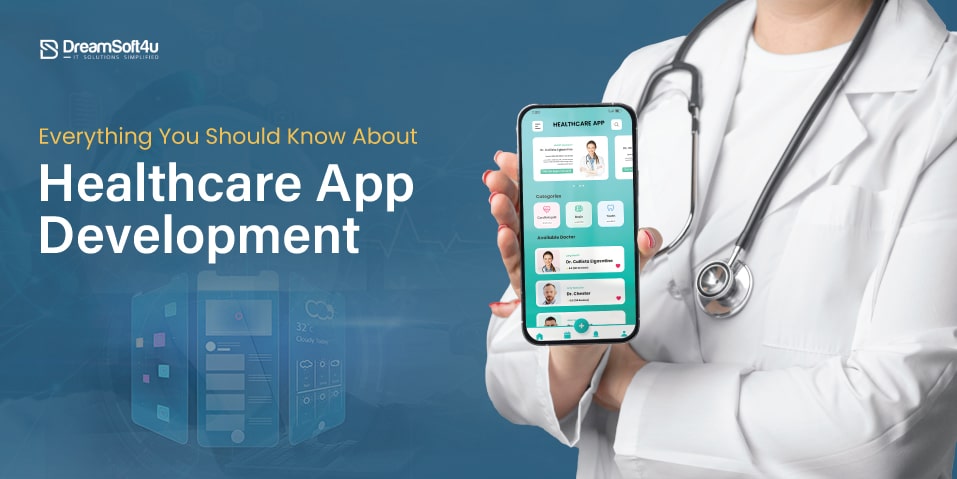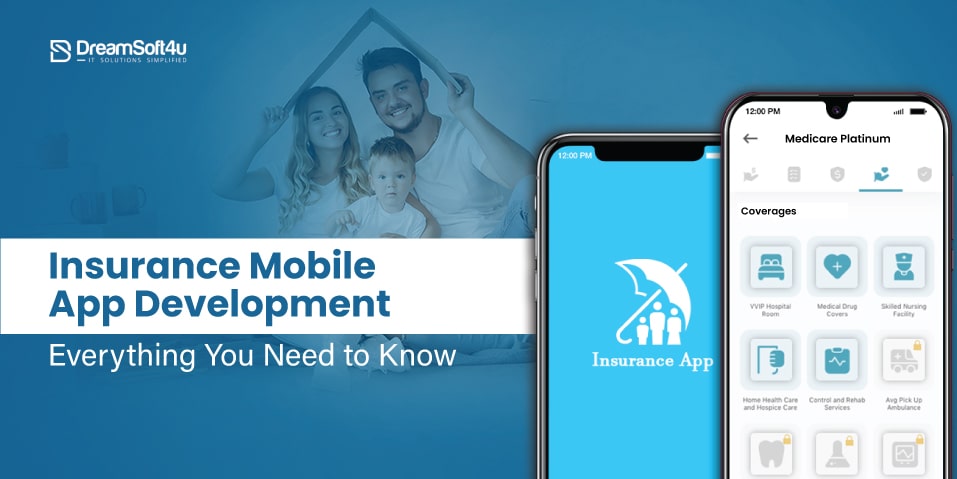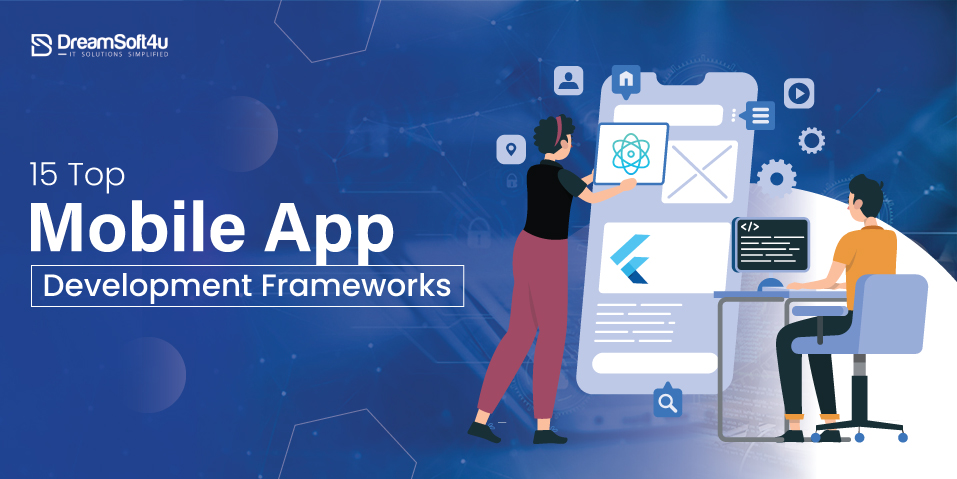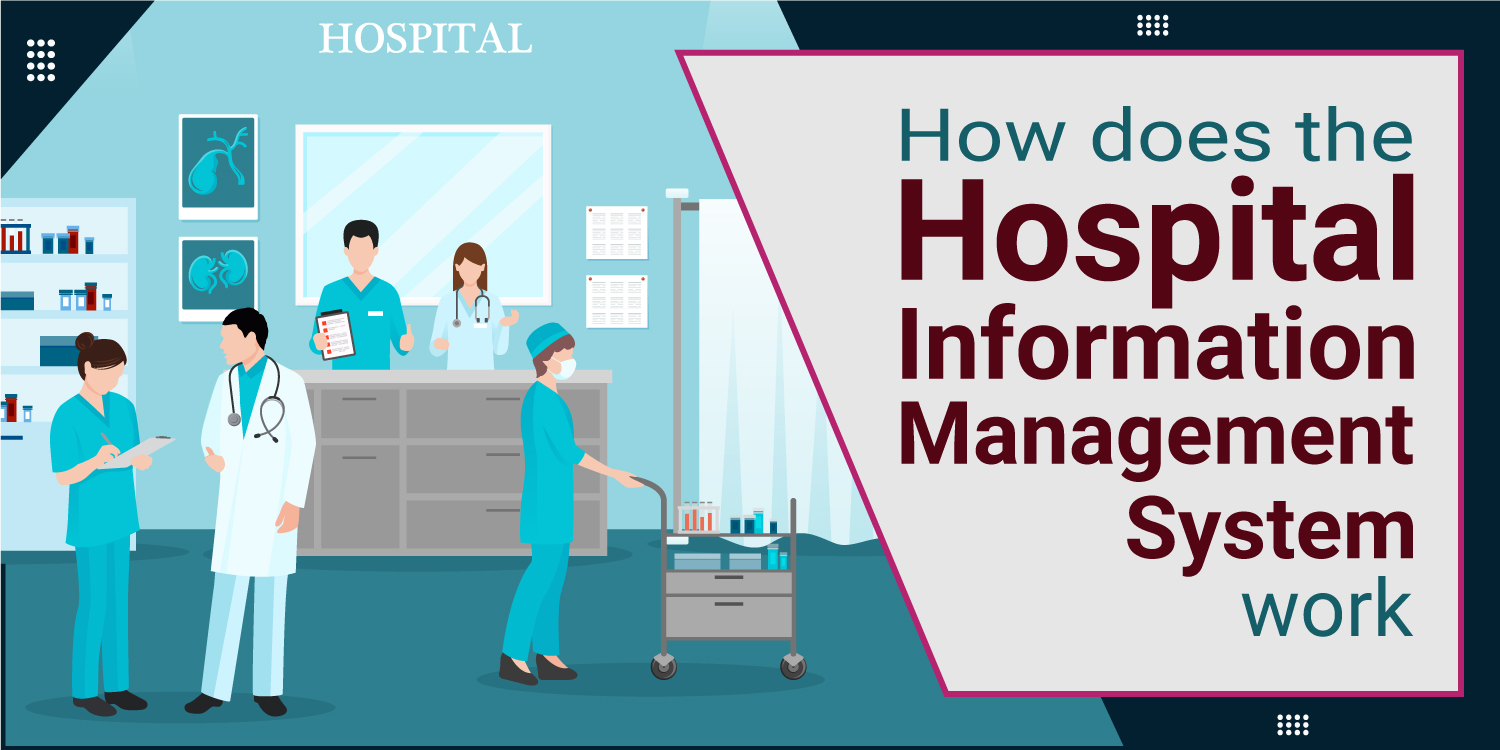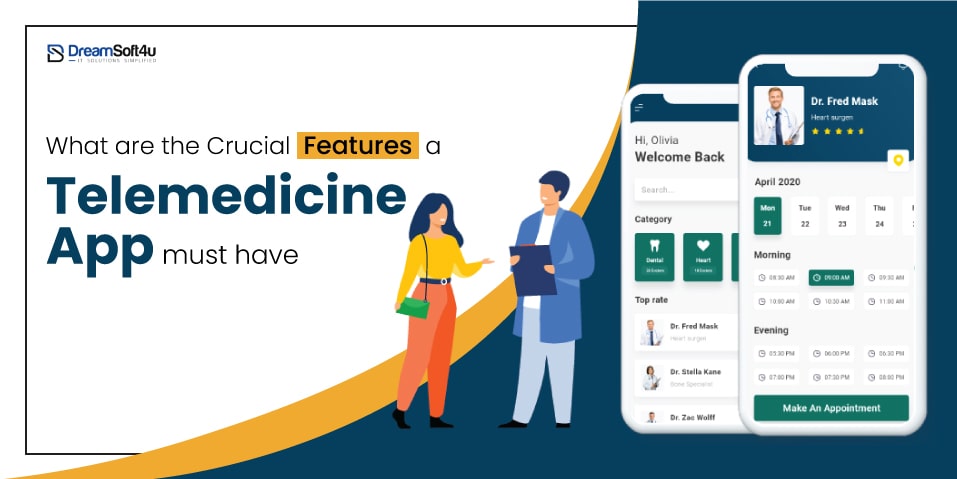The healthcare industry has grown significantly in recent years, especially after the COVID. The pandemic opened countless opportunities for the healthcare ecosystem to enhance patients’ experiences. Earlier, healthcare services were offered after meeting the patient physically. As the world took the path of digitization, Healthcare App Development was developed, offering high-quality medical services remotely. This eliminated the need for physical contact, saving time and cost.
Since you do not have to be physically present, it has become highly convenient for doctors and patients. Thus, healthcare applications have become a necessity in today’s world as they bridge the gap between doctors and patients. As a business owner, it’s high time you introduced this application to offer the best healthcare services.
Choose the best app development company If you plan to build your healthcare application. The company must have the relevant expertise and experience. In this guide, we will discuss healthcare app development in detail. Additionally, we will shed light upon a step-by-step app development process and more. So, without any delay, here we go!
Table of Contents
ToggleWhat is Healthcare App Development?
Healthcare app development is a comprehensive process which aims to develop a mobile application to meet your healthcare and wellness requirements. Additionally, these apps allow users to easily track their health status and talk with virtual doctors in real time to get tailored solutions.
These applications also make it easier for healthcare providers to track underlying diseases faster, monitor patients, schedule appointments and manage their staff efficiently. Patients can also schedule their visits and track their health status remotely, saving time and cost.
Five Essential Features in a Healthcare App
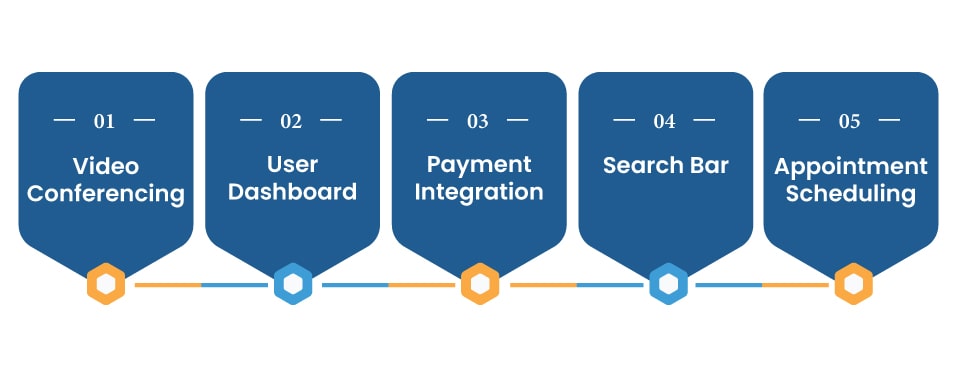
1. Video conferencing
Using the video conferencing feature, both doctor and patient can connect and talk in real-time without any outside distribution. This feature allows both parties to see one another, adding a human touch to the conversation. Moreover, this brings comfort, especially amongst patients suffering from chronic diseases.
2. User dashboard
An easy-to-use and visually appealing user dashboard is important for a better patient experience. On the user dashboard, patients and doctors can also read information at a glance. It also features a doctor’s experience, speciality, patient’s symptoms and health status.
3. Payment integration
Through the payment integration feature, patients can easily pay for medical services. Most healthcare apps support payment modes like credit and debit cards, UPI, Paypal and others. Additionally, these payment routes are extremely safe and allow doctors to collect payments timely.
4. Search bar
The search bar is an essential feature of the healthcare application. It allows patients to easily navigate through the application and search all relevant information. Moreover, if a patient needs to search for a particular doctor, they can get the information quickly using the search bar feature.
5. Appointment scheduling
On the healthcare apps, you can schedule an appointment in your preferred time slot using the appointment scheduling feature. As a result, this feature reduces staffing requirements and streamlines appointments. It reduces travel time and protects you from contracting viruses at the hospital.
Significance of healthcare app development for businesses
1. For medical professionals
Healthcare apps help with patient monitoring, staff management, early disease detection, and appointment scheduling. They allow doctors to connect with patients through video conferencing, promoting smooth diagnosis and medicine prescription.
2. For patients
Healthcare apps allow patients to track their overall well-being and get medical recommendations when necessary. These apps can also be used to track their fitness levels and suggest dietary changes. Above all, patients can also book appointments to seek medical advice.
Benefits of Healthcare Applications for doctors and patients
Benefits for doctors:
1. Fast decision making
Through healthcare apps, medical professionals have easy access to patient’s healthcare and medical reports. Additionally, they are aware of their symptoms, allowing doctors to better diagnose patients and make faster decisions.
2. Save time and cost
By automating appointment scheduling and other administrative tasks, there is no need for medical staff or doctors’ interference. As a result, this frees up the doctor’s time, allowing them to focus entirely on the patient’s health. Finally, It reduces overall time and cost invested.
3. Improved patient monitoring
Using healthcare apps, doctors can easily access the patient’s data and track symptoms. Finally, this allows them to make informed decisions and enhance the overall patient experience.
4. Better communication
Healthcare applications promote real-time communication and collaboration through video conferencing. This also promotes quick consultations and allows patients to share their symptoms and other health insights.
5. Continuous medical education
Most healthcare apps provide patients with access to medical journals, courses, and research updates. Moreover, it allows healthcare experts to remain updated about advanced medical requirements, promoting better patient care.
Benefits for patients:
1. Convenience and accessibility
Patients can consult with their chosen doctor, schedule appointments and access all medical data from home without travelling to the doctor’s office and sitting in long queues. Thus, it is highly convenient and accessible for patients. As a result, around 60% of mobile device users have downloaded the healthcare app on their smartphones.
2. Enhance communication with the doctor
Healthcare applications promote hassle-free and secure communication through video conferencing, allowing timely follow-ups and inquiries. Further, it also allows patients to share their health updates and related symptoms with the doctor, improving patient satisfaction.
3. Medication reminders
The healthcare app comes with an in-built notification feature that offers patients timely reminders to complete different tasks. Further, these include tracking their heart rate, attending appointments, and more. Reminders of dosage refilling are also sent, reducing the chances of missed doses.
4. Secure payment gateways
Healthcare applications have multiple secure payment options, including UPI, debit and credit, and more. Further, this allows patients to securely make payments to healthcare professionals.
5. Saving time and cost
Using healthcare apps, medical professionals offer you remote medical services. This reduces your travelling time and saves a lot of costs. Additionally, you will need a comfortable spot at home to discuss your symptoms and get tailored treatment plans.
What are the Steps to Develop a Healthcare Application?
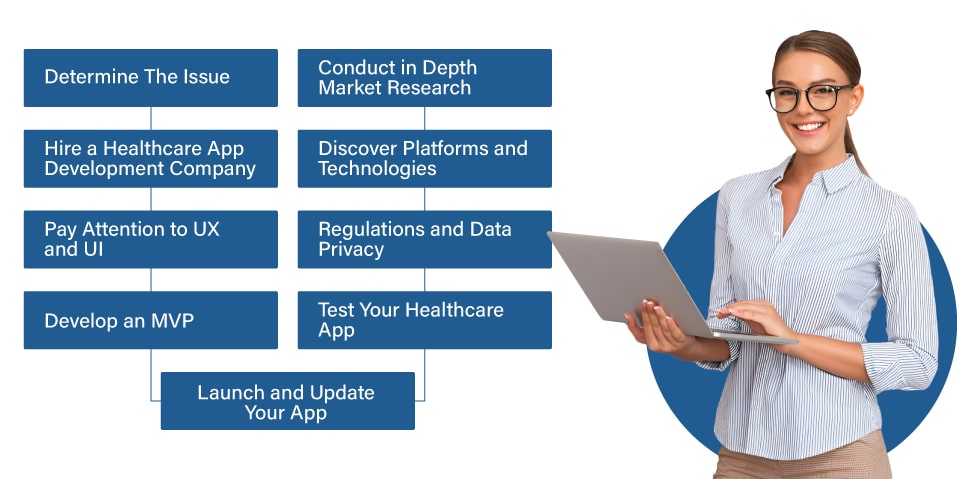
1. Determine the issue
First and foremost, it is important to determine the issue or the gap in the market that you need to fill by developing a healthcare app. For this reason, evaluate different problems that potential users are experiencing and understand their needs. Also, determine the type of app that you want to build and try to find solutions to all problems.
2. Conduct in-depth market research.
Once you have understood your targeted audience and their requirements, it’s time to conduct in-depth market research. The primary aim of this research is to analyze your competitors and determine market gaps that your application should fill. Additionally, this will help you trace out the app’s functionality and features.
3. Hire a healthcare app development company.
Hiring the right Custom healthcare software development company is important for a smooth development process. Experts here will also understand your aim, suggest vital features, and use the latest technologies to build a competitive app. Therefore, you must choose a company with skilled developers, project managers, and testers.
4. Discover platforms and technologies.
Choosing the right platform and tech stack for smooth healthcare app development is essential. Additionally, it is important to make decisions such as:
- Will the app be available on the web, iOS, Android, or all?
- What will be the primary functionalities of the healthcare app?
- Finally, which technologies will be used for app support?
5. Pay attention to UX and UI.
UI and UX are crucial factors determining the success of the healthcare application. Generally, senior citizens prefer a more simplified and easy-to-navigate application with a large font and less complexity. Younger patients go for a colourful and fun healthcare app with different features and functionalities. Finally, based on your target audience, choose the app’s design.
6. Regulations and data privacy
With the rising personalized healthcare app development, the demand for data privacy and security has increased drastically. Therefore, a software development company with experienced professionals will understand this. Further, they build apps based on the set healthcare regulations and standards, including FHIR and HIPAA-compliant solutions.
7. Develop an MVP
Developing an MVP is critical to creating a fully functional and highly competitive healthcare application. MVP development ensures the app is performing perfectly and well-developed before entering the market. Finally, here is the complete MVP checklist:
| Healthcare app MVP checklist | |
| Patients | Doctors |
| Patients profile | Doctor’s profile |
| 1:1 chatbot | 1:1 chatbot |
| Calendar to schedule | Calendar to schedule |
| Reminder notification | Patient’s scorecard |
| Surveys | Alerts |
8. Test your healthcare app
Another important step in healthcare app development is putting your app to the final test. Before entering the market, the application undergoes a comprehensive testing stage, during which it is tested in different situations. So, proper testing is important to mitigate all risk factors and determine bugs. Moreover, it greatly enhances overall efficiency and improves reputation.
9. Launch and update your app
Once the healthcare app passes the testing process, the development team is all set to launch it in the market. Once you have launched the app, continuously track its uses and overall performance. Finally, based on customer feedback, update your application to enhance the patient’s experience.
Some Best practices For Healthcare App Development
1. Systems interoperability
Since millions of companies are offering health systems, it ensures that hospital mobile apps are highly compatible with all existing systems. So, this has evolved into an important step that health application developers must remember.
2. Platform agnostic
Both applications intended for medical professionals and those interacting with patients must run well on tablets, PCs, and cell phones. The app’s users could be physicians, nurses, or other medical professionals, depending on what it does.
3. Include push notifications
Push notifications are an important feature of mobile mHealth app development. These actions remind users to refill prescriptions and pills and go for a consultation. Chronic health conditions get worse due to missed consultations. Thus, the push notifications feature is vital in these applications.
4. Feedback from patients
Considering your comments is always satisfying, even if you are a hospital patient. So, getting patient input is perhaps the easiest way for ambulatory clinics and hospitals to streamline their operations.
Top Healthcare App Use Cases
1. Data management or predictive analytics
In the healthcare industry, data analytics is known to be the next big thing! In addition to providing patients and clinicians with an accurate assessment of their present state of health, the development of monitoring tools and insights based on real-time and predictive analytics.
2. Telehealth
When social isolation made it difficult for people worldwide to see doctors, telehealth came to the rescue. Also, telehealth or telemedicine apps aim to establish a remote connection between the patient and the physician, which has proven valuable during extended quarantines.
3. Personal health assistance
A growing number of healthcare providers are releasing applications to act as patients’ health assistants in response to the growing costs of medical treatment. Additionally, any patient’s treatment journey must be successful, and this can only be achieved with consistent and routine physician visits.
4. Hospital management systems
Hospital management systems facilitate improved treatment outcomes by enabling care providers to become interoperable and gather data from a vast network of hospitals, outpatient centres, and other healthcare facilities.
Challenges Faced During Healthcare App Development
1. Security and safety concerns
Healthcare apps deal with patient’s personal and health information. According to statistics, more than 50% of healthcare apps are prone to cyber-attacks. It puts the patient’s personal information at risk. So, app developers must focus on ease of use and deployment simplicity while developing apps to avoid this. Thus, incorporating cloud security practices for software development is a great idea!
2. Integration and implementation complexity
Even though many people use mobile devices, there is a common issue with the integration and implementation of mobile health development apps. A mobile health solution app is not user-friendly and is challenging to integrate with the current system. Besides this, the app’s convoluted UI will negate its intended efficiency.
3. Patient engagement
Mobile health applications connect patients and doctors via video conferencing, allowing them to share symptoms and find solutions. Many healthcare apps fail to deliver the expected results, leading to bad medical experience. Therefore, it does not capture the patient’s interest.
4. Difficulty for all users
Healthcare apps with complex interfaces are not preferred by patients and doctors alike. This is because it becomes hard for patients to understand the overall navigation process, leading to frustration. If the app does not meet requirements, it is considered a failure. Thus, keeping a customer-centric approach during app development is important.
5. Patient’s concern over privacy
Patients generally fear sharing their personal information with healthcare experts or on healthcare app platforms. Further, this is because of the high chances of data breaches in the healthcare industry.
Get Your HIPAA-Compliant Custom Healthcare Software with industry experts
We have an experienced team of developers to provide a custom solution for your budget
How much does it cost to develop a healthcare app?
On average, developing and launching a healthcare application costs around $300,000. Major factors affecting the cost are features of your application and project size. So, the development company you choose also impacts the development cost.
How can DreamSoft4U help?
DreamSoft4U is a US-based leading healthcare app development company that delivers custom healthcare software solutions. The team has a strong foundation and a keen understanding of the intricacies involved in app development. Therefore, they follow a customer-centric approach to deliver cutting-edge software solutions.
We develop best-in-class solutions offering EMR and EHR solutions, telemedicine and telehealth apps. We also provide assistive technology software solutions and more. So, if you want access to the latest tech stack and highly scalable solutions, choose DreamSoft4U now!
Wrapping Up
Healthcare applications are needed for the hour as they promote offering top-notch medical services remotely. This eliminated the need to be physically present to meet your doctor and get tailored solutions. Besides benefits like great convenience and easy accessibility, it comes with various challenges that experienced healthcare app developers can tackle. So, if you are planning to build a highly competitive healthcare app, choose experts from DreamSoft4U!
Frequently Asked Questions
Q1. How do you choose the right app development company to develop a custom healthcare app?
Here are the steps to choose the best app development company:
- Research about potential companies
- Evaluate a company’s experience and expertise
- Consider security and compliance
- Request a proof of concept
- Get an in-depth proposal and cost estimate
Q2. What long does it take to develop a healthcare app?
On average, developing a healthcare app takes three to ten months. However, the time frame may increase based on the application’s complexities.
Q3. List major technologies used for the healthcare app development
Major tech stacks used for healthcare app development include Python, JAVA, Flutter, Swift and Kotlin. Above all, R programming is also widely used.
Q4. What are the reasons why healthcare apps fail?
Some reasons why healthcare apps fail are:
- Misleading data on the health diagnosis
- Inability to adapt customer behaviour
- Failure to understand customer needs
- Inefficiency app security
Q5. What services do healthcare applications offer?
Popular services are appointment scheduling, medical records access, symptom tracking, telehealth solutions, health monitoring and online consultation. It also includes diagnostics, faster prescriptions, and drug delivery.








